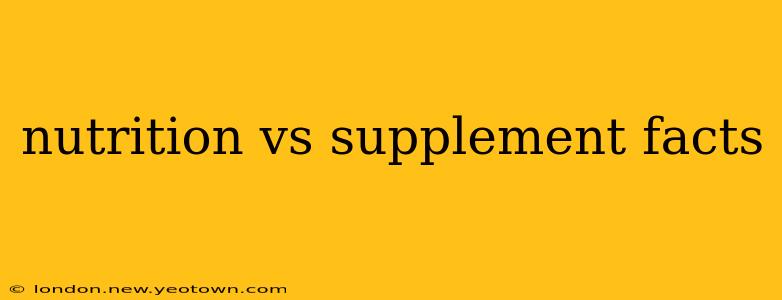The world of health and wellness is brimming with information, often leaving us confused about the difference between nutrition and supplementation. While both play a role in maintaining good health, they are fundamentally different. This article will delve into the crucial distinctions, helping you understand how to make informed choices for your wellbeing.
Imagine a vibrant garden bursting with colorful vegetables, luscious fruits, and fragrant herbs. This garden represents whole foods, the cornerstone of good nutrition. Now picture a small, carefully curated selection of individual nutrients, meticulously packaged – these are supplements. Both are important, but their roles and how we should utilize them differ significantly.
What is Nutrition?
Nutrition is the process of providing or obtaining the food necessary for health and growth. It's about the overall intake of essential nutrients from a balanced diet consisting primarily of whole, unprocessed foods. Think colorful fruits and vegetables, lean proteins, whole grains, and healthy fats. These foods deliver a complex array of vitamins, minerals, antioxidants, and fiber – all working synergistically to support optimal bodily function.
The foundation of good health isn't about individual nutrients; it's about the complete package. Each nutrient works in harmony with others, creating a complex web of support for your cells, tissues, and organs. A diet rich in whole foods provides this intricate balance naturally.
What are Supplements?
Supplements, on the other hand, are concentrated forms of individual nutrients, such as vitamins, minerals, herbs, or other substances. They are intended to supplement, or add to, your existing diet, not replace it. Supplements come in various forms, including pills, capsules, powders, and liquids.
While supplements can be beneficial in specific circumstances, they shouldn't be viewed as a quick fix or a replacement for a healthy diet. They are intended to fill nutritional gaps, not to compensate for poor dietary habits.
Are Supplements Necessary?
This is a question many people grapple with. For most healthy individuals, a balanced diet provides all the necessary nutrients. However, there are specific situations where supplementation may be beneficial:
- Dietary deficiencies: If you have a diagnosed deficiency in a specific nutrient, a supplement can help restore balance. This should always be guided by a doctor or registered dietitian.
- Increased nutrient needs: Pregnancy, breastfeeding, and intense physical activity can increase the body's demand for certain nutrients. Supplements may be helpful in these instances, but again, it's vital to consult with a healthcare professional.
- Specific health conditions: Certain medical conditions can impact nutrient absorption or increase the need for particular nutrients. A doctor can assess individual needs and recommend appropriate supplementation.
- Restricted diets: Individuals following restrictive diets, like vegans or vegetarians, may need supplements to ensure adequate intake of specific nutrients, such as vitamin B12 or iron.
What are the potential risks of taking supplements?
While supplements can be helpful, they also carry potential risks:
- Interactions with medications: Some supplements can interact negatively with medications, potentially reducing their effectiveness or causing adverse effects.
- Adverse effects: Excessive intake of certain nutrients can lead to adverse health effects.
- Lack of regulation: The supplement industry is not as heavily regulated as the pharmaceutical industry, meaning there is a greater risk of inconsistent quality and inaccurate labeling.
- False claims: Many supplements make exaggerated or unsubstantiated health claims.
How can I make informed decisions about supplements?
- Consult a healthcare professional: Always talk to your doctor or a registered dietitian before starting any supplement regimen, particularly if you have pre-existing health conditions or are taking medications.
- Choose reputable brands: Look for brands that are third-party tested and have a good reputation for quality.
- Read labels carefully: Pay attention to the ingredients, dosage, and potential side effects.
- Don’t rely on supplements as a quick fix: A healthy diet is always the best foundation for good health.
By understanding the crucial differences between nutrition and supplementation, and by prioritizing a balanced diet, you can take proactive steps towards maintaining optimal health and wellbeing. Remember, whole foods are the bedrock of a healthy lifestyle; supplements should be considered supporting players, not the stars of the show.

